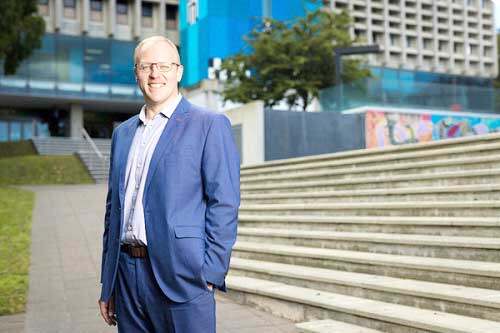The University of Waikato is closer to its goal of being carbon neutral by 2030, boosted by new funding announced by Climate Change Minister James Shaw this week as part of the $220 million State Sector Decarbonisation Fund, which is administered by EECA (the Energy Efficiency and Conservation Authority).


The University of Waikato received $1.31m which will go towards two projects – continuation of a campus-wide upgrade of lighting to more efficient LEDs and replacing gas heaters and gas domestic hot water cylinders across the Hamilton campus. These projects will reduce emissions by an estimated 5,718 tonnes over the next ten years.
“We really are leading the way in practical and tangible steps toward carbon neutrality, which includes real offsets. This latest investment will be a real game-changer for us, with thousands of tonnes of emissions being eliminated,” says Chief Operating Officer, Jim Mercer.
“We’re also marching ahead with other plans, including significant investments in solar power and building optimisation for our Hamilton campus. While sustainability principles are firmly embedded within our new developments – including The Pā and our Tauranga campus – our big challenge lies with our older infrastructure. This requires us to be innovative and attentive and continue to prioritise this work in everything we do.
“The first tranche of rooftop panels are being rolled out now and will provide an immediate benefit to both our emissions and our bottom line.”
The University has already made significant in-roads in delivering a raft of initiatives at its Hamilton campus which have seen a significant reduction to emissions. Gas hot water boilers in a section of student accommodation have been replaced with a biomass boiler and CO² heat pump and lighting in a number of buildings has already been replaced by LED alternatives.
Assistant Vice-Chancellor Sustainability, Professor Lynda Johnston, is encouraged by the programme of work underway and what lies ahead.
“It’s great to see the momentum build with our ambitious programme of work and for our staff and students to see some really visible examples of our commitment to being carbon neutral by 2030. In addition to activities on campus, we’re progressing with the electrification of our vehicle fleet and working with local authorities to provide subsidised public transport for our staff and students.
“We’re proud to be on this journey, walking the talk at a time when our world-first Bachelor of Climate Change (launched earlier this year) is making ripples across the globe,” she says. “Every little bit helps.”
Professor Johnston says students want to see the University tackling sustainability issues holistically and meaningfully, setting an example in contributing to the regeneration of the social, economic, cultural and environmental wellbeing of the region.
“This means setting ambitious targets, being transparent about how we’re tracking and constantly innovating in areas like travel, waste and water. We’re very fortunate to have some world-leading expertise inhouse helping to guide our thinking and implementation along the journey.”
The Waikato School of Engineering is leading a groundbreaking programme of research, Ahuora, supporting big industry in Aotearoa to transition to renewable energy for process heat, with the help of $12.5m MBIE Endeavour funding. Āmiomio Aotearoa, a multi-disciplinary team of researchers, is also providing an inspiring example in their work to advance a circular economy concept for New Zealand backed by $10.9m MBIE Endeavour funding.
“It is a really exciting time for the University of Waikato and while we have some hard mahi ahead of us, we’re well on the path and taking our responsibilities seriously, inspired in large part by the expertise we have within our own institution,” says Professor Johnston



































